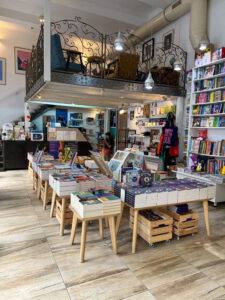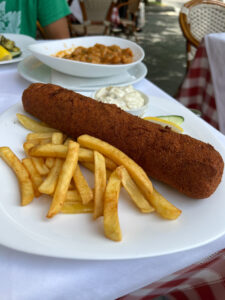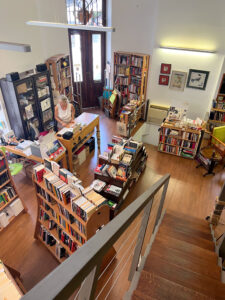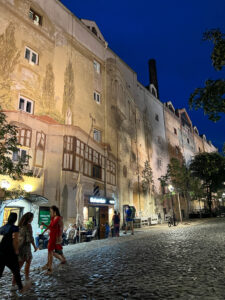
The entire idea for this trip started several years ago with a plan to backpack the Balkans. If you don’t know much about the geography of this region (and why would you if you don’t spend your spare time playing geography quizzes on Sporcle like…some of us do?), the Balkans refers to the countries that share the Balkan peninsula, which is that big chunk of land in Europe that’s to the right (across the Adriatic) from Italy. There isn’t actually a universal agreement about exactly what countries are considered the “official” Balkan countries, but most everyone agrees that the former countries of Yugoslavia (Serbia, Bosnia and Herzegovina, Croatia, Montenegro, North Macedonia, and Slovenia) count, PLUS Albania which was never part of Yugoslavia and Kosovo which is a brand new country that used to be part of Serbia. Some people include Bulgaria, some people include Romania, and some include northern Greece. When I started planning my trip, I knew I wanted to visit ALL of them.
I had several reasons for wanting to visit the Balkans. For one thing, I didn’t know very much about them. I didn’t have much background knowledge of Yugoslavia–our history textbooks in school were published before the Yugoslav Wars, so I never learned anything about the recent history of this area. But I did know that the Yugoslav Wars happened in my lifetime and that these countries relatively recently (in the last 20 years or so) opened for tourism. Seeing them would mean going off the aggressively beaten path of Western Europe which would mean a bigger challenge and a greater chance of discovering the unexpected. I wanted to understand the different cultures here and the ways in which it’s vastly different than the west. I wanted a different perspective than the negative stereotype that most people who only know the Balkans from when it was on the news every day in the 1990s have. (“Isn’t there a war over there!?!?!” said my dad. The most recent conflict ended here like 15 years ago.) And, of course, another draw for all travelers—it’s very cheap. In most of these countries you can spend like half, or even a third, the amount that you would have to spend visiting most popular cities in Western Europe.
A couple days after Michael joined me in Budapest, we hopped on a (very delayed) bus to head into our Balkan adventure without a super clear idea of what to expect. I’d done a ton of research, of course. I was prepared for everything to feel a bit more challenging in terms of transportation and modern conveniences. But I’d never been anywhere with so recent a war—I didn’t know what scars of war would look like. I didn’t know what the atmosphere would feel like or what the people would be like or what they would think of us.

We arrived near midnight at the bus station in Belgrade, and my first thought was, “Uh oh, what have we done,” and my second thought was, “Thank GOD Michael is with me right now.” I’ve been in Europe for 3 months now, and I can say with certainty that the time we spent outside that bus station in Belgrade was the only time when I felt actively unsafe. Which is NOT to say that I felt actually threatened, because I didn’t. It’s more that I felt that creeping unease that most women reading this are familiar with that feels like, “This isn’t right this isn’t right this isn’t right and I don’t like it” even if you can’t name a specific reason why you feel it. In all fairness, the bus stations in most EVERY city show you the worst possible impression of it. I hate that this is true, but it absolutely is. No matter how wonderful the city, the bus station will be perpetually dirty and full of beggars approaching you and taxi drivers trying to scam tourists. In the bus/train station in Bratislava, beggars would actually put their hands on you, and little kids begging would surround you—it was very unsettling. But I wasn’t as freaked out in Bratislava as I was in Belgrade because I arrived in Bratislava in daylight with the station fully opened. We arrived in Belgrade after the station had closed. The bus let us out in the big parking lot, and though you could walk into the station, there were no workers there. There were people who appeared to be homeless everywhere. Taxi drivers approached us and kept offering rides for insane amounts of money. (Please do not get in a taxi ANYWHERE when the driver is waiting at the bus to accost you. You will probably be fine, but you will also 100% be charged 5 times the price you should have been.) We didn’t have local currency yet, so we found an ATM in the station, and I felt like a criminal as I got money out because I kept jerking my head around making sure no one was lingering too close or watching. We tried to take the tram, but we had to have exact change for a ticket, and nothing was open. And we couldn’t get the rideshare app to work that Michael had downloaded in advance. No one did or said anything inappropriate. No one approached us. Nothing bad happened at all. But we both FELT creeped out, and neither of us felt that way in any other city before or after. And I truly still don’t know if that says more about the place itself or more about us.

We finally got the taxi app to work after like 20 minutes of increasing nervousness, and we made it to our hostel. At first I wondered if that bad first impression was bleeding into the rest of our visit. The next day, we walked to the big central square to do a walking tour, and it’s the only walking tour of the whole trip that I left without finishing. We were just… not feeling it. At all. We were walking around this downtown area assuming this would be the place where things were the most modern and give us the best glimpse of what Belgrade really is today, but all I was seeing and feeling was cold and off-putting. I’d arrived in Serbia looking for hidden beauty, and instead I was finding a place full of gloomy, brutalist architecture and people who didn’t seem happy. But I knew backpackers loved this place—surely I was missing something.
Michael found online that a big beer festival was happening in town, and we thought, well great, that’s where we will find food and music and happy people! So we walked to the festival grounds. The walk was bleak, at best. It was near 100 degrees. I began to notice this weird juxtaposition that I continued to find throughout the rest of the city where there would be something expensive and modern positioned right next to something falling apart, like a billboard of fancy perfume in front of what looked like a bombed-out building. It looked like every other building had been abandoned. We didn’t find the beer festival. We found where it was supposed to be in this giant and sweltering field, but it didn’t look like they’d even started setting up. But next to it was this very fancy mall with all western stores that could have just as easily been in New York City. I couldn’t make sense of it.

As we were considering leaving a day early, we stumbled upon a very different part of town that was clearly either new or had been revitalized. And suddenly we were in a different place entirely. There were bookstores! So many bookstores. English language bookstores, cat bookstores, bookstores with tea shops, chain bookstores. There were a ton of restaurants. Everything was clean. There were people smiling! We ate lunch at a place with a delightful waiter who sat me in front of an industrial sized fan and served me chicken schnitzel, which turned out to be a fried tube of chicken the size of my arm. We discovered burek in Belgrade, which is a Turkish dish that’s basically like a thin pastry shell filled with cheese, potatoes, or spinach, which we adored and would continue to eat in every city afterward. And that night, we visited what we were told was the “bohemian” street in town. It was cobble-stoned and full of string quartets playing for the outdoor diners at every restaurant. And even though we ended up waiting for AN HOUR for someone to take our order at our restaurant and ended up giving up and leaving, it was very beautiful.
I thought at first that the cities I visited in Switzerland would be my least favorite on my trip. But that was before I visited Belgrade. And I feel a little bit of guilt about that still because I wonder how much of my distaste is affected by the perception that I’ve developed of Serbia politically. I think I arrived in Serbia without a strong stereotype in my mind, but perhaps with the underlying thought, “This is a Russian ally,” which in this current moment could of course intensify any negative observations I had. (I read one article that referred to Serbia as Russia’s “Last Friend in Europe,” and that’s not a title I’d be proud of in this moment. Belgrade refuses to impose sanctions on Russia still.) We continued to other countries and learned about the Yugoslav Wars from the countries who had fought against Serbia. There’s no real way to make such information entirely objective. I remember saying to Michael, “Why is it that Serbia seems to ALWAYS be the aggressor here?” The ongoing tension with Serbia and Kosovo felt infuriatingly wrong and like Serbia was the bully on the playground messing with the tiny and defenseless new kid (which is, obviously, a very biased perspective, and a very American one). And all of this together made me feel more and more dislike of Serbia as a country the farther I got away from it. And the thing is—that’s not fair.

While I DO think that Serbian leadership is not a group of individuals that I’d want to have anything to do with, that has NOTHING to do with the Serbian people. I also know that with my 5-minute Google searches, I know roughly .001% about the complexities and nuances of anything in the country that I might have an opinion about, so please feel free to disagree with every word I’ve said. I also recognize that it was America that was largely responsible for the NATO bombings in 1999 which destroyed so much of the city, so the bombed-out and abandoned buildings are likely America’s fault. (In spite of this, I didn’t hear any anti-American sentiment while there.) We met so many Serbian people who were lovely, just like we met so many who were unpleasant (which is exactly what a person could say visiting any place in the world). As a person who traveled to a Muslim country during Trump’s presidency, I know very well the feeling of not wanting to be judged based on assumptions and leadership that is out of your control and that you don’t feel personally represent you. I met several other people from Serbia on this trip after leaving the country, and they were all lovely (just like I personally know a number of people from Russia who I, of course, don’t have ANY negative feelings toward because of what their leadership is doing right now. It’s horrifying to think about how easily we could unintentionally stereotype people if we aren’t careful). I know so many travelers who really love cities in Serbia like Novi Sad and Subotica, and I would love to visit them and see how different they feel than Belgrade. I’m also very glad that we stayed and got to see past that first impression. I’m glad we found some beautiful parts of the city instead of jumping to a conclusion too quickly.
This isn’t really a post to say that I didn’t like Belgrade. Because there were parts of Belgrade that I did like, and at the very least, I found the place interesting (if perplexing). It’s more to say, be careful with first impressions and make sure you’re looking past them. Research places before you visit them (you would be SHOCKED at how many people are aimlessly traveling with copious amounts of money who haven’t even researched where they are.) but know that research can only give you a surface-level glimpse. Please tell me if you loved Belgrade and why! And if you’re traveling by bus, try to arrive at your stations before dark.


I just discovered your blog and I can say already say, you have your own style, it’s like you are telling a story (which actually is). Keep up the good work !
This is the absolute kindest! It means so much to me. (I know I told you this in person back in Italy, but it worth saying again!)